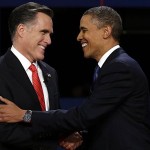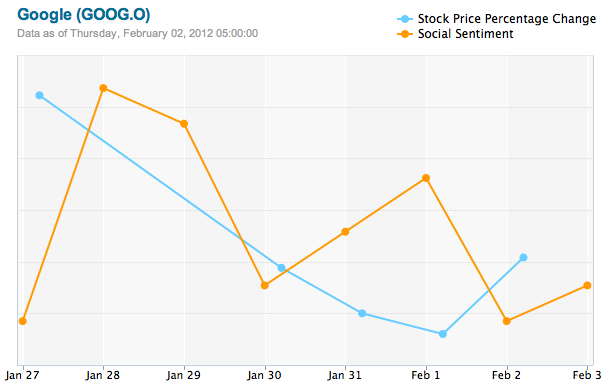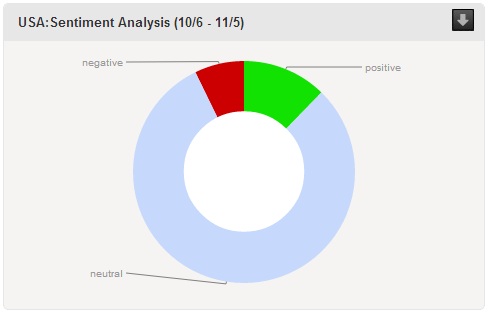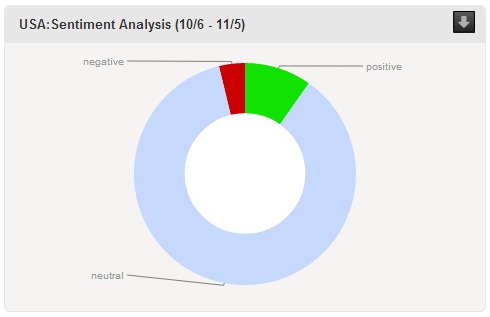 The idea that we can use social media chatter to predict the future is not a new one. The sheer size of networks like Facebook and Twitter mean that if nothing else, social media can provide researchers with limited funding a large sampling of data that can be sorted and organized quickly with algorithms. Everything from trends in the stock market to future weather patterns have been the subject of these social media prediction studies.
The idea that we can use social media chatter to predict the future is not a new one. The sheer size of networks like Facebook and Twitter mean that if nothing else, social media can provide researchers with limited funding a large sampling of data that can be sorted and organized quickly with algorithms. Everything from trends in the stock market to future weather patterns have been the subject of these social media prediction studies.
In 2010 Sitaram Asur of HP Computing Labs completed a study where they predicted box office revenues from social media chatter. Their predictions were accurate enough to lend some real credibility to the idea that you can predict the future with nothing more than social media data. The box office predictions showed a strong correlation in the rate at which tweets related to each movie were generated and the box office take. In their study they also attempted to show a correlation for sentiment, but found that it only played a part after the initial release, when tweets included reviews from people who had actually seen the movie.
Another novel idea that turned practical involved Derwent Capital’s “Twitter Hedge Fund” that uses mood and chatter to rate stocks that the company then invests in. In July of 2011 when the media first picked up on the story, the Hedge Fund made 0.76 percent while the S&P 500 fell 2.2 percent. This was enough evidence for financial analysts and investors alike to take notice. Initial research suggests that the general mood of Twitter Users shows some correlation to the movement of the Dow Jones Industrial Average.

Earlier in 2012 researchers showed a correlation between the share price of Google stock and social sentiment. Financial indicators are believed to be even more accurate when it comes to stocks related to the Internet.
Other outcomes that have been recently subjected to the predictive power of Twitter with positive results include red carpet awards shows, predicting terrorist attacks, and the winners of upcoming elections. On the heels of what could be the most important (and closest) election in American history, I couldn’t help but to take a look at what Twitter was saying about the battle between Mitt Romney and Barack Obama. Is it predicting the winner as we speak?
Considerations for The Best Results
To start my study, I looked at several sources for social media data, the election process as a whole, and the data available to use in a prediction. Since this election will boil down to the Electoral College votes from just a handful of states, I wasn’t able to take the approach I would have liked (which would have been to determine which states were still up for grabs, plot the chatter and sentiment results, pro-rate the outcomes to the number of electoral votes assigned to that state, and tally the results.
I didn’t have the software capable of running such an in-depth analysis, so I decided to predict the winner of this week’s Presidential Election by looking at the sentiment of Tweeters in the USA using People Browser’s Kred Playground. Since primary indicators in almost all of these predictive analyses is chatter and sentiment, I also looked at the overall number of tweets mentioning the two candidates in the last month. Here are our results.
For terms I decided to use the candidates last names because when using their full names, Mitt Romney was mentioned a couple million more times. Most tweeters likely refer to Barack Obama simply as Obama, and there are no doubt tweeters that call Mitt Romney just Romney.
Mitt Romney
For the term ‘Romney’ there were a total of 19,521,382 global mentions in the last 30 days, and 875,542 in the USA that were assigned a positive or negative sentiment. 548,787 of those tweets were Positive, 326,755 of those tweets were negative. In the case of Mitt Romney, 62.7 percent of the tweets expressing sentiment were positive while 37.3 percent were negative.

A graph showing sentiment analysis of the term Romney for US Tweeters.
Barack Obama
For the term ‘Obama’ there were a total of 21,257,851 global mentions in the last 30 days, and 883,779 in the USA that were assigned a positive or negative sentiment. 553,002 of those tweets were Positive, 330,777 of those tweets were negative. In the case of Barack Obama, 62.6 percent of the tweets expressing sentiment were positive while 37.4 percent were negative.

A graph showing sentiment analysis of the term Obama for US Tweeters.
Seriously?
The reality is that this election could go either way tomorrow. I wanted to field a clear prediction from social sentiment however, but it seems that even Twitter can’t make up their mind which candidate to vote for. With a difference of just over .1 percent, the results are closer than any poll in the United States.
Even though the sentiment shows the candidates tied for popularity, Obama had a clear edge when it came to overall mentions. However, more users were likely refer to Mitt Romney simply as Mitt than they were to refer to Obama as Barack. Even still, the term Romney came within 4,215 mentions when it came to US tweeters. Overall 49.8 percent of chatter mentioned Romney while 50.2 mentioned Obama.
Results
Romney held a .1 percent lead when it came to expressed sentiment, and Obama had a .2 percent lead in overall sentimental mentions. Our research leads to a tie any way you look at it. The results reflect a division between parties that has never been so great.
No matter who wins the election tomorrow, I think most social media users will be happy to put it behind us. Social Networks aren’t made to handle such a high level of vitriol. That’s why no one is saying that Facebook will be a deciding factor in the election this year. Even with two campaigns that are relying heavily on smear tactics, I find it comforting that there were still more Tweets associated with positive sentiment for each candidate (although, I feel like 90 percent of the posts going across my Facebook feed are decidedly negative).
How do you think social media plays a part in the 2012 election? Do you think our results of a split vote are representative of the tweets you’re seeing? Will you be glad on November 7th when we can go back to posting cat pictures? Tell us about it in the comments below!
- The Evolution of Marketing: From Catalogs to Cat Blogs - November 8, 2022
- How to Make a Tweet This Link - February 5, 2022
- Dramatically Improve Marketing Results with Advanced Analytics - September 20, 2021
- The Next Chapter for Social Media Sun - June 4, 2013
- Optimizing Your FAQ to Maximize ROI - December 5, 2012
- Blogging Isn’t a Rocket, It’s More Like a Roller Coaster - November 19, 2012
- Weapons of Influence and Klout’s Role in Marketing - November 17, 2012
- The Biggest Problem With Inbound Marketing Blogs Today - November 16, 2012


